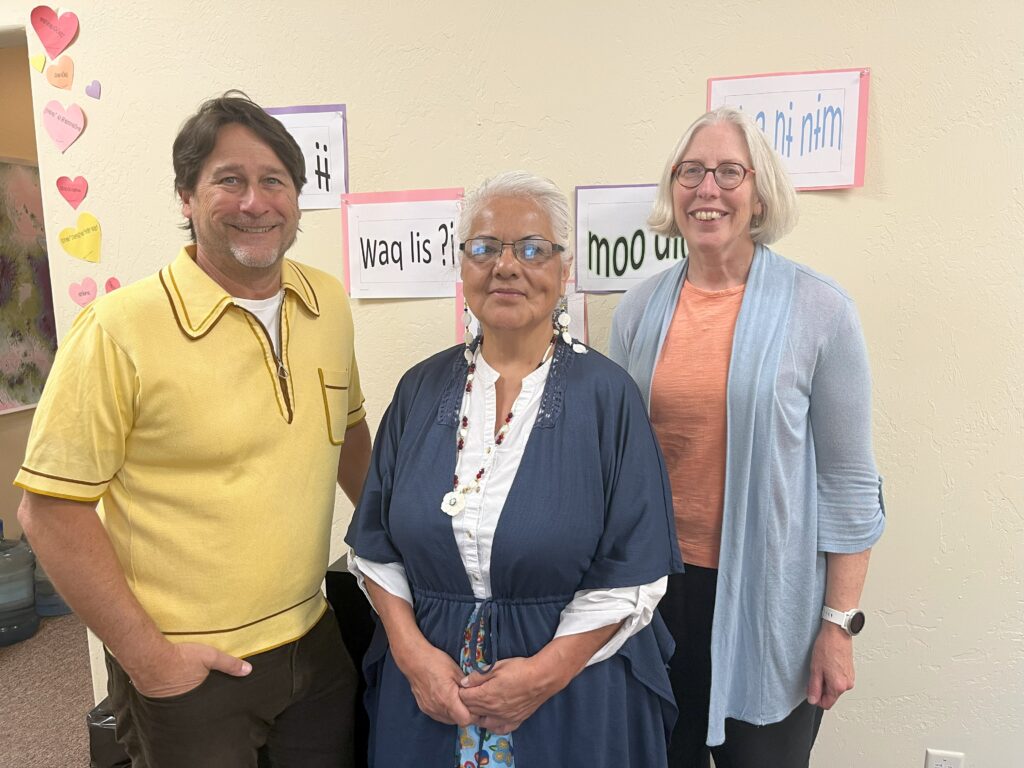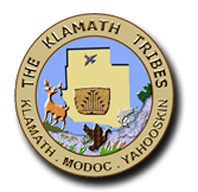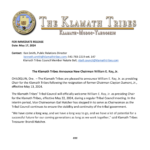FOR IMMEDIATE RELEASE
Date: June 29, 2023
Contact: Ken Smith, Public Relations Director
kenneth.smith@klamathtribes.com; 541-783-2219 ext. 147
Download full .pdf Press Release
Northwest Indian Language Institute Provides Valuable Support to Klamath Tribes Language Department and Other Tribes
CHILOQUIN, Ore. – The Northwest Indian Language Institute (NILI) at the University of Oregon has been supporting Native language programs since 1997. Its mission is to support and strengthen language preservation and revitalization efforts. NILI Interim Director, Robert Elliott, and Associate Director of Project Development, Joana Jansen, are currently meeting with tribes from Oregon, Northern California, Washington, and Idaho to conduct a needs analysis. They visited the Klamath Tribes this month to talk with GeorGene Nelson, Director of the Language Department.
NILI was originally founded by representatives from a number of tribal communities around Oregon, Washington, and Northern California. Now the organization is in a transition phase, said Elliott, and working with tribal language programs to outline a clear path moving forward is a priority.
“We felt it was important in this period of change and ship to go back and have a conversation with folks again to get a sense of where their language programs are at now, where their needs are, and how an organization like NILI or a similar organization could address some of those needs,” he said.
“That’s one of the reasons we’re here, is to find out what are the needs,” Jansen added. “Is it program development? Is it needs assessment, teacher training, curriculum development, or assistance with technology? So, we’ve partnered with tribal nations, based on where they see gaps, and if it’s a place that NILI can help fill that gap or point folks to resources.”
Nelson contacted NILI last summer, requesting assistance in digitizing several hundred audio tapes from elder and fluent speakers from the tribe that had been recorded. The University of Washington Language Center stepped in and is now digitizing those tapes so they are preserved and available for the future. “We have people approach us for all kinds of things,” Elliott said. “Whether a grant or technology choices, such as setting up a recording lab. If we can’t do it ourselves, we try to find appropriate resources that we can help tribal communities connect with, and get their needs met as much as possible.”
Elliott admits that there are vast needs for all the tribal language programs. Having access to teaching materials is in great demand across the board, he said. “With that – everybody is struggling,” he said. “You know, you don’t have a textbook, like you do with French, or Spanish or even Arabic or Swahili, which even these less commonly taught languages typically will have some materials in the language and everything has to be done. So, these needs are vast, and then what we’re really trying to see is what’s in our wheelhouse that we can help with. Consulting on different projects that pop up like the technology or how do we get a test developed so that we can assess our teachers and get them certified.”
In setting up the Klamath Tribes Language Program digital library, he said they offered Nelson guidance on options and choices to move forward with the project. And it is this kind of support that is invaluable to tribal language directors.
“A lot of the tribes of these language programs are very small,” Elliott said. “I think NILI’s like that hub where we can connect different programs to each other. But we can also advise because we can say, well, over in Umatilla, they’re doing this, and down in Warm Springs they’re doing this, and that’s valuable to you in Klamath because you can hear what other people are working on or thinking about. And so, we can be that kind of center of collecting some information about what groups are doing. What are some of the trends, what are some things people are thinking about?”
NILI is currently holding its weeklong annual Summer Ins2tute at the University of Oregon campus from June 25 to July 1. It’s been conducted for the past 25 years, providing workshops and language programs, allowing language program instructors and directors to meet face-to-face, and connecting the community of language practitioners. It’s the first in-person Institute gathering in three years, following the COVID pandemic, when they had to host it online. Nelson is attending, along with 30-35 participants from Oregon, Washington, Idaho, and Northern California.
“It’s pretty regional this year,” said Jansen. “Sometimes it’s been more from across the country to work together for the week on building language teaching skills, and a lot of collaboration and relationship building as well.”
“We provide daily workshops and training that they’ll be going through,” added Elliott. “Honestly, I think one of the most valuable things is the ability to be able to create a community of practitioners; people that are doing a similar thing, because, again, working out here in Chiloquin, it can feel isolating if you’re the main person doing language. And, now, GeorGene will have the opportunity to meet other people doing the same thing and make those connections. And to me, when people walk away, and they’re like, Oh, now I can ask them over there what they’re doing. And I feel like I’ve built a larger community of people doing the same thing. I think that’s incredibly valuable in the work that we do.”
Tribal languages across the country are being pushed to their limits, and languages could be lost forever, Elliott said. “Some people talk about dead languages,” he said, “and it’s the term that I think isn’t in use among people doing this kind of work. People more often speak about reviving languages or sleeping languages that can be brought back. There are tribal communities that have had no speakers. Some2mes the speakers have passed away 50, 60, or 70 years ago – the last first language speaker. But they have what we call new speakers. And these new speakers are young people that are learning it, not as their first language.
“So, they’re probably learning English at home,” Elliott said. “But they’re learning it as a second language, and they’re not learning it to go travel and order at a restaurant or go to the post office and send something home like we would if we were taking a French or Spanish class. They’re learning more about their identity and who they are, and continuing to maintain their culture and carry on, like language keepers. They’re keeping this part of who they are, and what that means intact and passing it on. And it may be a different form than it used to be, but it’s still perfectly valid as a language and used for different purposes than you would if you were, say, studying Japanese, or Korean or anything else.”
Jansen and Elliott said work to preserve tribal languages is not just happening regionally, but globally, in indigenous communities in Asia, Africa, Mexico, and South America. In recognition of tribal languages and the urgency to preserve them, the United Nations declared 2022 to 2032 to be the decade of indigenous languages with a global focus on increasing awareness and providing support for some of the smaller languages that are endangered and threatened of being lost.

Northwest Indian Language Institute Interim Director Robert Elliott and Joana Jansen, Associate Director of Project Development and Coordination, met with GeorGene Nelson (Center), Director of the Language Department for the Klamath Tribes. (Photo by Ken Smith/Klamath Tribes. Image available for media use.)
About The Klamath Tribes
The Klamath Tribes primary mission is to “protect, preserve and enhance the spiritual, cultural and physical values and resources of the Klamath, Modoc and Yahooskin Peoples by maintaining the customs of our ancestors.” The heart of Tribal life is centered in the area of Chiloquin, Oregon and includes 12 Departments, Health Clinic, Childcare Center, Tribal Court, goos oLgi gowa Center, Research Station, and three tribal enterprises. The Klamath Tribes’ 12 departments facilitate service delivery to multiple aspects of tribal life, including health and fitness, education, economic development, social services, cultural preservation, natural resource protection and more. For more information visit https://klamathtribes.org/.





